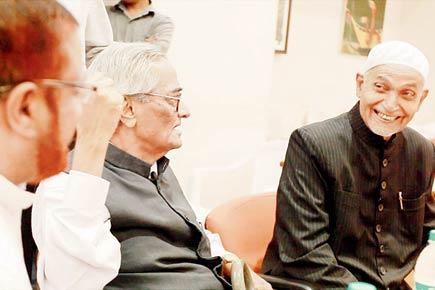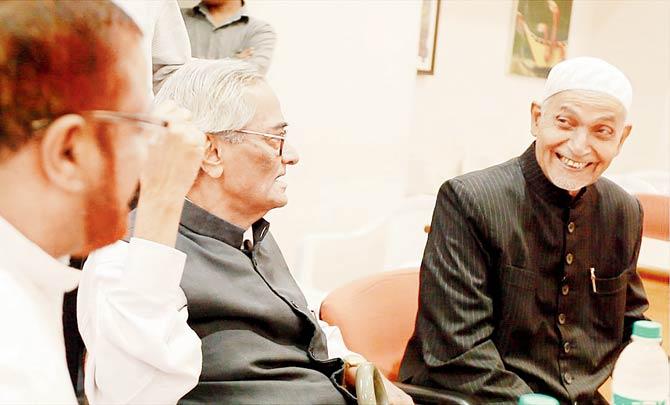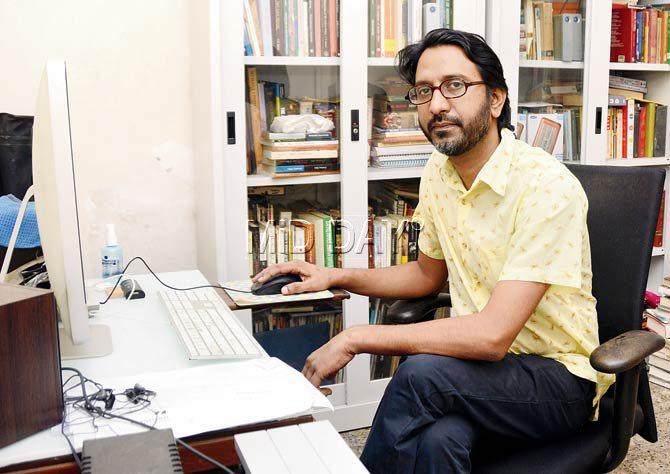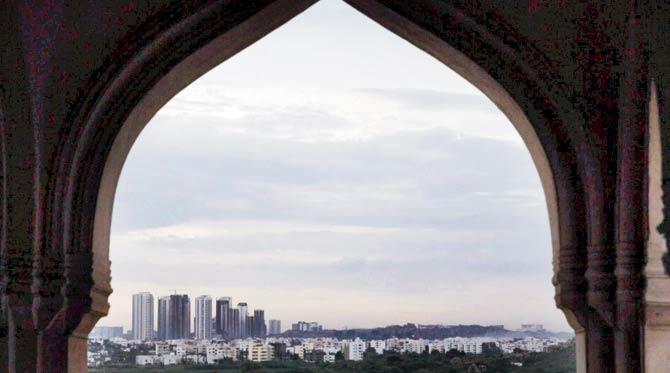An upcoming documentary uses the satirical performance-poetry tradition of the Deccan Plateau to explore the region's history and language


For his research, Pemmaraju spoke to poet Ghouse 'Khamakha' (right) and Urdu humourist Mujtaba Hussain (centre)
Hey Allah, you've filled the world with beautiful maidens/ And after death, virgin angels forever?/ What it is, what it's not, who knows.
ADVERTISEMENT
This verse is from a poem written by Mohammad Himayatullah, a senior poet and a well-known name in the field of Dakhani Mizahiya Shayri (humour-satire poetry). This year, you can learn more about this tradition through an upcoming documentary, A Tongue Untied: The Story of Dakhani.

Gautam Pemmaraju at his studio in Bandra. Pic/Sneha Kharabe
The film is produced and directed by Mumbai-based filmmaker Gautam Pemmaraju. "I am originally from Hyderabad, and have been writing about and researching the city for years. I have always known of Dakhani satire-poetry. On a national level, the tradition has been reduced by Hindi cinema to the caricaturesque character, à la Mehmood. There's much more to this strong satirical tradition than funny accents and comic sketches," he says.
 A scene from the documentary shows new real estate projects in Hyderabad
A scene from the documentary shows new real estate projects in Hyderabad
His film, thus, follows the humour-satire performance poetry tradition of the Deccan Plateau through its poets of the '40s to contemporary humourists. It uses the popular tradition to look at the history of the Dakhani language, the much parodied spoken vernacular, which fell into decline in the early 18th century. It traces the journey from the mystical compositions of Sufi settlers of the 14th century to romantic creations of the sultans of the region in the 15th and 16th centuries.
"Urdu may have originated in the North but literary Urdu began coalescing in the South. The Deccan Plateau region has over 350 years of literary culture the language, from the 1400s to 1700s and through the reign of Bijapur Sultans, Qutub Shahi and Golconda Kings, where Dakhani flourished as the language of the court," he says. One expert in the documentary speaks of how 'history writers consciously obliterated all traces of literary development elsewhere apart from Delhi'.
Pemmaraju's labour of love began in 2012 with a grant from the India Foundation for the Arts. His research for the film involved travelling across the region, speaking to linguists, poets involved in the arts, language historians, Sufism historians in the Deccan and other scholars.
A scholar in the trailer says, "If you want to destroy a culture then destroy its language. It is now conclusive that Dakhani is a regional speech form." But Pemmaraju is quick to add that besides the poets keeping the tradition and language alive, there is a small revival of films and stage plays in Dakhani in the last 15 years. "The language is spoken on regional Urdu channels. The mushairas continue although some old-timers may object to their quality, comedians are doing sketches, there's a major interest in Dakhani art ,and it has become a very important area in Urdu scholarship. There are limitations but there is an interest in the language so it is very much alive," he says.
The film, which is being crowd-funded, is in its final stages and should be complete by April, after which Pemmaraju plans to screen on the festival circuit.
Log on to: dakhani.com
 Subscribe today by clicking the link and stay updated with the latest news!" Click here!
Subscribe today by clicking the link and stay updated with the latest news!" Click here!







